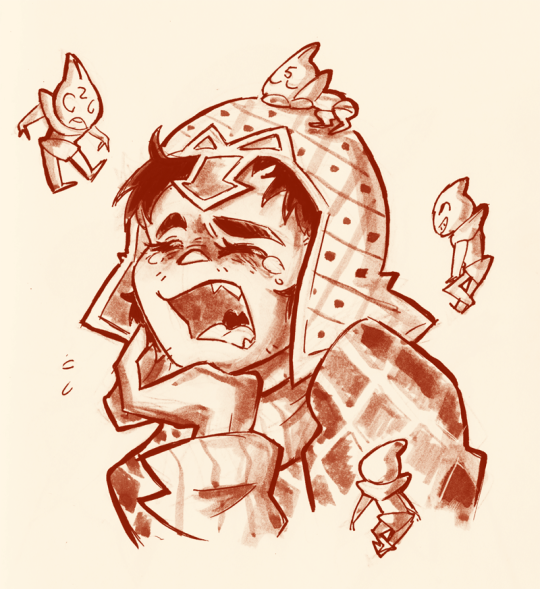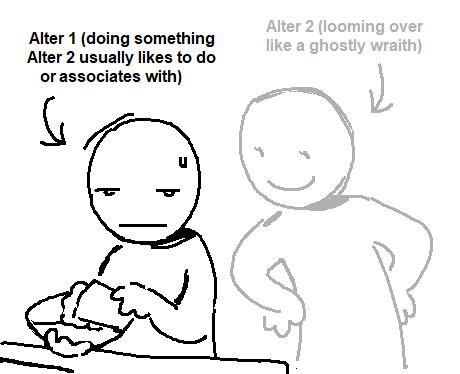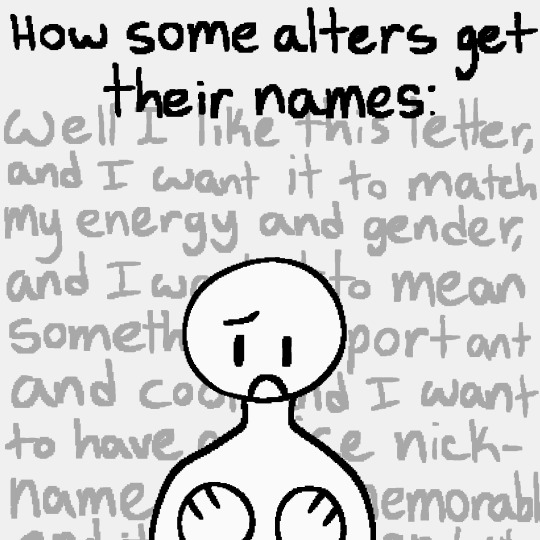blog for the ones that don't want their own. content warning. please do not follow if under 18. no pronouns. just call us 'bunny'. there will be no steady content of any flavor. this blog will be a dumpster fire. you have been warned.
Don't wanna be here? Send us removal request.
Text
theres been a lot of talk about the problems with shinigami eyes (the browser extension) lately but i think the funniest one is going to their github and finding out that for a brief period the wikipedia page for okra was marked as transphobic. like. the plant.

the woke mob got to my okra.... my fuckin okra....
6K notes
·
View notes
Text
“I don’t want to be a burden” you’re more like a relief, a gift, a blessing actually
100K notes
·
View notes
Photo

MISTA!!! DAIJOUBUUUUU?????
(I see it’s also this loser’s birthday today. What a coincidence that i had this queued for this exact day!)
115 notes
·
View notes
Text
I feel like it might be worth reminding everyone that the purpose of a debate is not to convince the other side of your opinion, but to seek an understanding of each other's opinions by listening and challenging the areas of the opinion that you find faulty. The syscourse community has really deviated from that and it's sad to see how unwilling the majority of us are willing to be open minded or have our beliefs challenged.
49 notes
·
View notes
Text
Funniest part of being a system and having a job is just the most unlikely system members end up doing work. Yeah Cinderpelt from Thunderclan is doing data entry using Microsoft Excel what about it.
2K notes
·
View notes
Text
127K notes
·
View notes
Text

Reminder that you can wholeheartedly love your system and sysmates and still have days where you feel tired of being a system. Sometimes being a system makes hard days easier, but sometimes it makes them harder, and that’s okay too.

1K notes
·
View notes
Text
Your sysmates are not inconveniences. They are not a disease. They are not your subjects, or sideshows to your life, or obstacles in your way, or toys to be bought and played with and discarded, or in any way lesser than you. They deserve to live their lives and make their own choices.
Do not lock away your sysmates. Do not destroy or delete their things, or read their private journals. Do not hit them or shun them or give them the silent treatment. Do not go on social media to trash-talk them and call them terrible people and tell the world how much you'd like them gone. Do not call them something they do not wish to be called. Come on, guys. This is as simple as the golden rule.
I said in a post some time ago, and have said repeatedly since, that there is no way out of coexisting with your sysmates. You can't ever leave, not for the rest of your life, and neither can they. The only real decision you have is figuring out how much pain you would like to inflict on each other before you learn how to live together. So do yourselves a favour and spare yourselves the melodrama. If nothing else, bad behaviour towards your sysmates will inevitably backfire on you. After all, they have the entire rest of your life to thwart your efforts to suppress them.
But I would still caution viewing this in the selfish way, because strong relationships with your sysmates are their own rewards. You and your sysmates will find something beautiful beyond words when you love each other, especially if they or you have never felt that kind of love before. When you know each other and support each other and are able to work together to achieve a goal, then the benefits reap themselves. It is essential you get to this point.
Of course, you and your sysmates need to put the work in. You can't make a relationship with wishes and good vibes. A lot of strategies to achieve this end are pretty straightforward, though not necessarily easy. Learn to compromise and have civil disagreements. Don't form cliques or gang up on each other. Make rules that prevent you from stepping on each others' toes all the time. Befriend your sysmates, but if this is incredibly difficult, adopt the "roommate strategy"-- that is, have good enough "housekeeping" (in this case, general life habits and behaviour) that you will not drive each other insane, and avoid intruding on each others' things. Learn how not to stew on your problems and to address them in a way that doesn't devolve into yelling.
Most importantly, though, I will once again reiterate that you should let your sysmates have the freedom, within reason, that they want to have. If the 10-year-old boy wants to say "fuck" and play Call of Duty, let him. If the teenage girl really wants to blast Taylor Swift on the way to work instead of what you want to listen to, quiet your mental ranting about how much you hate Taylor Swift, and pass her the aux. If the old man wants to spend his Saturday morning completing the crossword instead of being productive, then let that man finish his damn crossword. If you do this, then your sysmates will leave you alone when you do what you want to do. But-- and this is the important part-- when you show they can trust you on the little things, they will trust you with big things, and vice versa. You cannot get to the point where your sysmate trusts you with their deepest traumas if they cannot trust you to put up with listening to them talk about their interests. This is how your system becomes a support system: step-by-step, slow and steady, until it reaches critical mass.
No, your sysmates are not inconveniences. The real inconvenience is the one you cause yourself when you treat them like objects. No-one-- not you, certainly not them, not anyone around you-- benefits from adversarial in-system relationships. Your sysmates are individuals, and they deserve the respect that everyone deserves. (Even if they do not identify as people, they should still be treated with the kindness and decency you would treat a person with.) Most critically, they are individuals who will be there, night and day, 24/7/365, for the rest of your life. So stop locking them up or gossiping about them or otherwise making life harder for yourself and for them, and start acting accordingly.
498 notes
·
View notes











